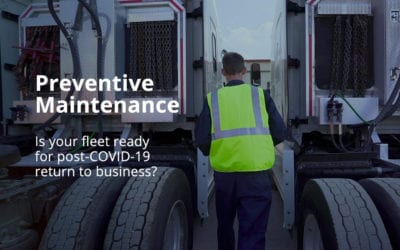5 Details Fleet Managers and Drivers Should Include When Reporting Road Service Incidents

Timely dispatch of repair crews during breakdown incidents is critical for keeping your fleet on the move. The key to efficient response is providing clear and accurate information when reporting a roadside assistance incident. Fleet managers are often the first point of contact for stranded truckers. Gathering these important details about the incident will help you streamline the process and save valuable time.
Here are 5 helpful details fleet managers and drivers should communicate to the dispatch teams when reporting a commercial truck roadside assistance incident:
1. Breakdown Location
Providing accurate breakdown location details is crucial for a repair crew to quickly service the incident. The more specific the location details, the better. These may include:
– description of nearby businesses, buildings, and/or landmarks
– gate codes to access the unit at a warehouse or other gated areas
– point of contact on-site
GPS coordinates are another way to ensure the location’s details are accurate. Drivers can easily share their coordinates when using the FYX Mobile app.
2. Vehicle Breakdown Information
Proper identification of a potential root cause of the breakdown will help expedite roadside repair. Fleet managers and drivers can ensure the right information is relayed to the repair crew by providing specific information about the incident, such as:
– What area of the unit has been affected (i.e.: tires, engine, etc.)
– Is the vehicle drivable or does it need towing
– Breakdown category the service should be identified as (i.e.: tire replacement, major or minor mechanical repairs, etc…).
3. Equipment Unit Number
Your tractor, trailer or chassis unit number provides road service professionals with detailed information about the equipment, including historical data of all repairs. In its essence, the unit number represents the identity of the equipment. Sharing the number with your dispatcher will provide your roadside assistance team with crucial information about potential parts and repairs needed.
4. Billable Account Type
FYX customers should share their billable account type with dispatchers when reporting and incident. Fleet managers should mention whether their company is On Account with FYX, TRAC Connect, or needs to pay with a credit card. The specific account details allow us to access your company’s Standard Operating Procedures and payment structure.
5. Driver’s Contact Information
This may seem obvious, but quite often fleet managers will call in to place an order without knowing the specific contact details, such as the name and direct phone number of the driver who requested service.
Additionally, fleet managers may also need to provide contact information of the authorized user, as this person is responsible for authorizing any repairs that are over the cost limit.
Reporting Incidents Is Easy When Using The FYX Platform
Our FYX platform makes it easy to report incidents to minimize downtime. This innovative software delivers real-time service monitoring and streamlined communications across all phases of the repair process. Learn more.
Ask FYX Experts any questions you might have about road service or fleet maintenance.
RECENT POSTS
8 Essential Repair Tools Every Truck Driver Should Carry
Truck drivers are always working on tight deadlines. That's why they all use a good GPS system to find the best, fastest routes. But it's not just traffic that can slow you down. Unexpected repairs and emergencies happen when you least expect them - and being properly...
Preventive Maintenance: Are You Ready for Post-COVID-19 Return to Business?
The impact of COVID-19 (Coronavirus) has been felt across the supply chain - from logistics firms and distributors to manufacturers, suppliers and motor carriers. Even as countries that felt the first wave of the pandemic such as China begin to recover and slowly get...
Guidelines for Truck Drivers Delivering Essential Goods to COVID-19 Hot Spots
Truck drivers across the country are facing unprecedented challenges due to the COVID-19 (Coronavirus) pandemic. Many state-run rest stops are closing or, cutting back on parking space along key logistics corridors. Dine-in restaurants have shuttered or limited...




